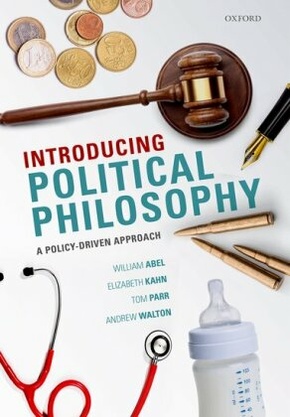Introducing Political Philosophy - A Policy-Driven Approach
| Verlag | Oxford University Press |
| Auflage | 2021 |
| Seiten | 296 |
| Format | 17,5 x 1,5 x 25,0 cm |
| Print PDF | |
| Gewicht | 456 g |
| Artikeltyp | Englisches Buch |
| EAN | 9780198783275 |
| Bestell-Nr | 19878327EA |
Offering a uniquely policy-driven approach, Introducing Political Philosophy is the only text to showcase contemporary policy problems through the lens of key debates in political philosophy.
Introducing Political Philosophy is a thought-provoking introduction that invites readers to consider and analyse the philosophical controversies that underpin several prominent areas of political debate.
The opening chapter familiarises students with the aims and methods of political philosophy. It explains the tools required to practice the discipline, and discusses how to apply these to political arguments. Each of the fifteen subsequent chapters focuses on a distinct area of public policy, such as affirmative action, humanitarian intervention, immigration, and parental leave. The authors introduce students to the moral questions that lie at the heart of these political disputes, as well as to some of the relevant academic literature.
The authors believe that the best way to learn about political philosophy is to see it in action. By arguing for a position in each chapter and defending it against criticisms, they demonstrate to students how political philosophy ca n inform our analysis of public policy.
Introducing Political Philosophy is available for students and institutions to purchase in a variety of formats, and is supported by online resources.
The e-book offers a mobile experience and convenient access along with hyperlinks a list of web-links, and self-test questions, helping to test your knowledge and understanding of policy areas, and the philosophical arguments that influence them: www.oxfordtextbooks.co.uk/ebooks.
· Student resources: a curated list of websites help you to deepen your knowledge of policy areas, and self-test questions help you to critically evaluate key points from each chapter.
· Lecturer resources include: seminar activities to encourage student engagement, discussion and debate; guidance on using the teaching activities; a teaching guide explaining how to get the most out of the book's inside-out approach; and customisable PowerPoint slides on key topics, thinkers, and concepts to aid effe ctive teaching preparation.
Inhaltsverzeichnis:
1: Doing Political Philosophy
2: Euthanasia and Freedom
3: Hate Speech and Freedom of Expression
4: Recreational Drugs and Paternalism
5: Affirmative Action and Discrimination
6: Schools and Equality of Opportunity
7: Basic Income and Distributive Justice
8: Parental Leave and Gender Equality
9: Minority Exemptions and Multiculturalism
10: Judicial Review and Democracy
11: Prison Sentences and Punishment
12: Intensive Animal Farming and Moral Status
13: Environmental Taxes and Intergenerational Justice
14: Immigration and the Political Community
15: Development Aid and Global Justice
16: Humanitarian Intervention and Political Self-Determination

